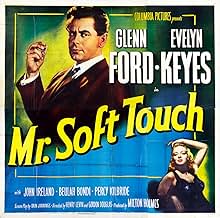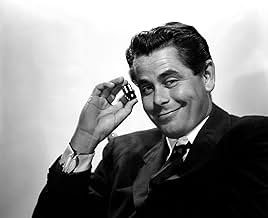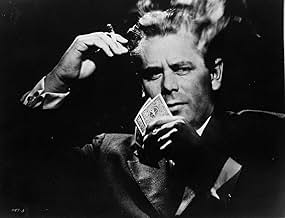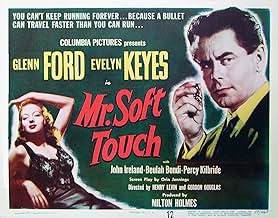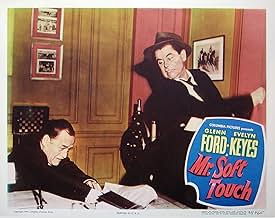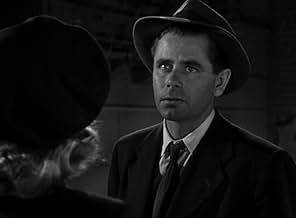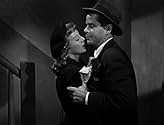NOTE IMDb
6,6/10
1,4 k
MA NOTE
Ajouter une intrigue dans votre langueWhen he learns that a gangster has taken over his nightclub and murdered his partner, returning WW2 hero Joe Miracle steals the money from the club's safe and hides in a settlement home, whi... Tout lireWhen he learns that a gangster has taken over his nightclub and murdered his partner, returning WW2 hero Joe Miracle steals the money from the club's safe and hides in a settlement home, while the mob is on his tail.When he learns that a gangster has taken over his nightclub and murdered his partner, returning WW2 hero Joe Miracle steals the money from the club's safe and hides in a settlement home, while the mob is on his tail.
- Réalisation
- Scénario
- Casting principal
Leon Alton
- Piano Mover
- (non crédité)
William Bishop
- Radio Broadcaster
- (voix)
- (non crédité)
Oscar Blank
- Tenant
- (non crédité)
Angela Clarke
- Clara Christopher
- (non crédité)
Gene Collins
- Yanzi's Cohort
- (non crédité)
Heinie Conklin
- Towel Deliveryman
- (non crédité)
Mikel Conrad
- Officer Miller
- (non crédité)
Ralph Dunn
- Tollgate Policeman
- (non crédité)
Avis à la une
The credentials for a superb Noir are all there: Glenn Ford has been one of the most convincing (and still strangely unsung) anti-heroes American cinema has produced. The wonderful opening sequence (in which Ford escapes both the police and the mob) is as minimalistic ally brilliant as the seemingly tight budget would have allowed. Yet after only a short while the film's tone changes radically: sweeter music, romantic comedy and a (however underplayed) Christmas tear-jerker emerge from what promised to be a crisp, economic little masterpiece.
I'm not saying the uneven pacing ruin the film completely but my suspicion is, looking at the credits (no, I don't mean the cast which features a wonderfully noir-ish array of characters: Evelyn Keyes, John Ireland, Ted de Corsia) there are TWO directors (one made good noirs with Ford, the other made Rat Pack flicks with Sinatra, Davis Jr, Martin et al), TWO directors of photography...
For what it's worth my guess is the producer got cold feet and hired a second director to save (a lame comedy? a routine noir?) a product he wasn't very happy with. He probably made a mistake...
I'm not saying the uneven pacing ruin the film completely but my suspicion is, looking at the credits (no, I don't mean the cast which features a wonderfully noir-ish array of characters: Evelyn Keyes, John Ireland, Ted de Corsia) there are TWO directors (one made good noirs with Ford, the other made Rat Pack flicks with Sinatra, Davis Jr, Martin et al), TWO directors of photography...
For what it's worth my guess is the producer got cold feet and hired a second director to save (a lame comedy? a routine noir?) a product he wasn't very happy with. He probably made a mistake...
Here is a strange movie. Depending on what part you are tuned into, you may be watching a gangster movie with vintage Depression-era wise-guy chatter, or a heart-touching true-meaning-of-Christmas film, or a comic variation on a "Crazy House"-type theme, featuring scenes with eccentric characters pontificating weirdly. Then I saw that there were two directors, so maybe that is why the film shifts so much.
Not that it is bad. On the contrary, "Mr. Soft Touch" is quite an entertaining movie, with a fast-paced script that barely ever pauses to catch its breath. The reason this film works for me is that Glenn Ford so easily slides from film-noir to romance to comedy and back and forth again. A very interesting role for Glenn, perhaps inadvertently given a chance here to show how versatile he could be.
Evelyn Keyes plays an interesting character as well. It is unusual for a film made in what was still the 1940's to feature a character who so openly refers to, and sometimes uses manipulatively, a handicap such as deafness; the references to the hearing aid may make a modern viewer a little uncomfortable.
The only character who seems out of place is John Irelands's crusading reporter. He wears a pair of dark-framed, "please don't hit me" glasses, which don't seem right for some reason. His character is perhaps a good guy, perhaps not; we never really find out, and in the end, neither we nor the directors seemed to care. Just not sure how he really fits in.
From a social standpoint, "Mr. Soft Touch" presents an up-close and intimate look at private charity in the days before the government took over that role. We get a chance to spend quality time with those caring souls who fought tirelessly against an endless shortage of money and supplies, and who believed that it was worth helping people, even if it was only one person at a time. No one in this movie whines about getting a check from the government.
The bottom line, then, is that you have a film that is part "Little Caesar", part "Its a Wonderful Life", part "Bowery Boys", and part "You Can't Take it with You". If you accept the genre-changes that occur haphazardly throughout the film as all part of the fun, then you can have yourself an enjoyable hour and a half in the company of "Mr. Soft Touch".
Not that it is bad. On the contrary, "Mr. Soft Touch" is quite an entertaining movie, with a fast-paced script that barely ever pauses to catch its breath. The reason this film works for me is that Glenn Ford so easily slides from film-noir to romance to comedy and back and forth again. A very interesting role for Glenn, perhaps inadvertently given a chance here to show how versatile he could be.
Evelyn Keyes plays an interesting character as well. It is unusual for a film made in what was still the 1940's to feature a character who so openly refers to, and sometimes uses manipulatively, a handicap such as deafness; the references to the hearing aid may make a modern viewer a little uncomfortable.
The only character who seems out of place is John Irelands's crusading reporter. He wears a pair of dark-framed, "please don't hit me" glasses, which don't seem right for some reason. His character is perhaps a good guy, perhaps not; we never really find out, and in the end, neither we nor the directors seemed to care. Just not sure how he really fits in.
From a social standpoint, "Mr. Soft Touch" presents an up-close and intimate look at private charity in the days before the government took over that role. We get a chance to spend quality time with those caring souls who fought tirelessly against an endless shortage of money and supplies, and who believed that it was worth helping people, even if it was only one person at a time. No one in this movie whines about getting a check from the government.
The bottom line, then, is that you have a film that is part "Little Caesar", part "Its a Wonderful Life", part "Bowery Boys", and part "You Can't Take it with You". If you accept the genre-changes that occur haphazardly throughout the film as all part of the fun, then you can have yourself an enjoyable hour and a half in the company of "Mr. Soft Touch".
I see from other reviews that some viewers are troubled by this film's failure to fall squarely into the comedy or noir genres. Maybe that's why I like it, for isn't life a mixture of comedy and tragedy? My interest didn't flag during the movie as I found it fresh and original and the plot twists unpredictable. I'm not a big Glenn Ford fan but he hits this nail squarely on the head. Even though his Joe Miracle is more accurately a victim than a baddie, he has been sucked into the world of crime and violence. Can the beautiful Jenny Jones redeem him, and can he even survive? It's lineball all the way. Evelyn Keyes is just lovely to look at, and there's lots of character actors doing their bit, some of them only children. I'm going off to do a bit of research on who wrote it and who directed it. They deserve kudos. Surprisingly good entertainment.
A war hero returns from the service and winds up stealing his own money back from the mob in "Mr. Soft Touch," a 1949 film starring Glenn Ford, Evelyn Keyes, John Ireland, and Ted de Corsa.
Ford plays Joe Miracle (shortened from his Polish name) who comes home before Christmas and finds out his partner in a club has been murdered by the mob, and the mob has taken his money. Joe retaliates by breaking into the club and stealing $100,000 from the safe. With everyone looking for him, Joe has a friend buy him a ticket to Japan, but the ticket is for a later date. So he takes off and enters a settlement house run by Jenny Jones (Evelyn Keyes). Jenny thinks Joe is a musician down on his luck. Meanwhile, a newspaper columnist who knows what happened wants Joe's story and is trying to track him down. In writing about Joe, the mob picks up his trail.
Given the cast, Mr. Soft Touch was obviously intended to be a noir but turns into kind of a Christmas romance with comic aspects. For some reason it failed to hold my interest, even though I love Glenn Ford. The acting was good all around, but I preferred the beginning noir and wish it had stayed on that route. The original director was replaced, possibly to change the direction of the movie.
Someone on this board mentioned that John Garfield would have been better in this role. He would have been very good as he always was, but he and Ford were different kinds of types and actors. Garfield looked and acted tough, and Glenn Ford was Everyman. I think his casting in this is the better choice. Joe is a likable, nice guy who was ripped off by the mob while he was off serving his country. Glenn Ford didn't have Garfield's range, but in the right role, he was very effective. And, I might add, easy on the eyes.
Ford plays Joe Miracle (shortened from his Polish name) who comes home before Christmas and finds out his partner in a club has been murdered by the mob, and the mob has taken his money. Joe retaliates by breaking into the club and stealing $100,000 from the safe. With everyone looking for him, Joe has a friend buy him a ticket to Japan, but the ticket is for a later date. So he takes off and enters a settlement house run by Jenny Jones (Evelyn Keyes). Jenny thinks Joe is a musician down on his luck. Meanwhile, a newspaper columnist who knows what happened wants Joe's story and is trying to track him down. In writing about Joe, the mob picks up his trail.
Given the cast, Mr. Soft Touch was obviously intended to be a noir but turns into kind of a Christmas romance with comic aspects. For some reason it failed to hold my interest, even though I love Glenn Ford. The acting was good all around, but I preferred the beginning noir and wish it had stayed on that route. The original director was replaced, possibly to change the direction of the movie.
Someone on this board mentioned that John Garfield would have been better in this role. He would have been very good as he always was, but he and Ford were different kinds of types and actors. Garfield looked and acted tough, and Glenn Ford was Everyman. I think his casting in this is the better choice. Joe is a likable, nice guy who was ripped off by the mob while he was off serving his country. Glenn Ford didn't have Garfield's range, but in the right role, he was very effective. And, I might add, easy on the eyes.
"Mr. Soft Touch" is an odd sort of film. It's like merging a film noir movie with a schmaltzy family film--and the results are far from great. Now I am not saying it's a bad picture--but it could have easily been a lot better--mostly because of its saccharine script.
The film begins with Glenn Ford on the run. It seems he held up a nightclub and stole $100,000. But was it exactly stealing? It seems that the club had belonged to Ford but while he was off fighting in the war, it was stolen out from under him. So, the money is just payback for what was rightfully his--at least in his mind. The problem is that the mobsters who now run the place are not about to let him get away with it...and Ford needs to get out of the country ASAP.
Now here is where it gets bizarre. His boat doesn't leave for a day so Ford tries to get himself locked up for the night--as he figures at least he'll be safe. But a do-gooder social worker feels sorry for him and gets the police to agree to release him to her program--something Ford really doesn't want. And, after a while, Ford's tough-guy persona is slowly eroded as he starts to think of others and care about the people in this Salvation Army-like setting. What's next? Well, it is predictable but a bit ridiculous--so watch it if you are really, really curious. I wouldn't.
Ford's character is a bizarre enigma. He's supposed to be tough and nasty--and he's good at that. But later, he's supposed to be a softy--and this just never range true. Nor, for that matter, did the script.
The film begins with Glenn Ford on the run. It seems he held up a nightclub and stole $100,000. But was it exactly stealing? It seems that the club had belonged to Ford but while he was off fighting in the war, it was stolen out from under him. So, the money is just payback for what was rightfully his--at least in his mind. The problem is that the mobsters who now run the place are not about to let him get away with it...and Ford needs to get out of the country ASAP.
Now here is where it gets bizarre. His boat doesn't leave for a day so Ford tries to get himself locked up for the night--as he figures at least he'll be safe. But a do-gooder social worker feels sorry for him and gets the police to agree to release him to her program--something Ford really doesn't want. And, after a while, Ford's tough-guy persona is slowly eroded as he starts to think of others and care about the people in this Salvation Army-like setting. What's next? Well, it is predictable but a bit ridiculous--so watch it if you are really, really curious. I wouldn't.
Ford's character is a bizarre enigma. He's supposed to be tough and nasty--and he's good at that. But later, he's supposed to be a softy--and this just never range true. Nor, for that matter, did the script.
Le saviez-vous
- AnecdotesActor Roman Bohnen passed away from a heart attack shortly after filming on February 24th, 1949 a little more than 5 months before the movie's release.
- GaffesIn a long shot, Joe is driving through an alley that has one trash can. In a closeup shot, there are two tall trash cans and one short can into which he dumps the dough. When he returns to retrieve the money, the shorter can is on pavement with its top nowhere near where it was, almost level with the taller cans in the earlier shot.
- Citations
Joe Miracle: What's that smell?
Jenny Jones: Poverty.
- Bandes originalesLight Cavalry Overture
(uncredited)
Music by Franz von Suppé
Played when Joe is putting up Christmas decorations in the gym
Meilleurs choix
Connectez-vous pour évaluer et suivre la liste de favoris afin de recevoir des recommandations personnalisées
- How long is Mr. Soft Touch?Alimenté par Alexa
Détails
- Date de sortie
- Pays d’origine
- Langue
- Aussi connu sous le nom de
- Mr. Soft Touch
- Lieux de tournage
- Varennes Street and Union Street, San Francisco, Californie, États-Unis(police chasing Joe near the beginning - they make a right turn on to Union St. here)
- Société de production
- Voir plus de crédits d'entreprise sur IMDbPro
- Durée1 heure 33 minutes
- Couleur
- Rapport de forme
- 1.37 : 1
Contribuer à cette page
Suggérer une modification ou ajouter du contenu manquant

Lacune principale
By what name was Cinq millions dans une poubelle (1949) officially released in India in English?
Répondre
